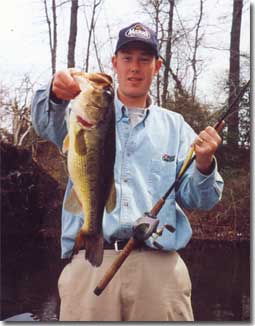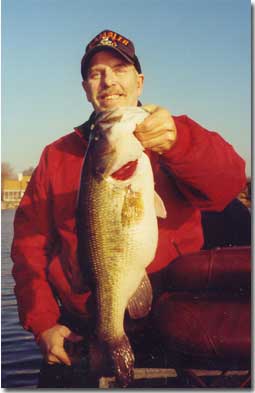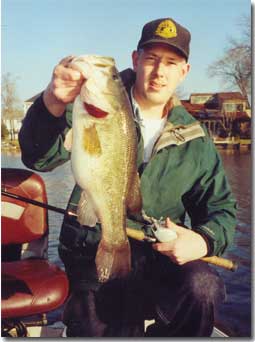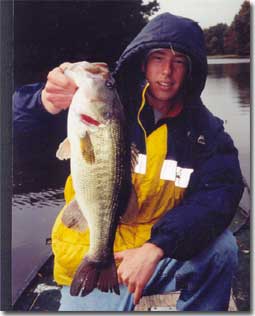 Spinnerbaits
are not just a tool for the spring and fall. Spinnerbaits
can be deadly, if the right ones, were fished in a
variety of situations weather it be the East Coast
or the West. The trick is to be able to distinguish,
which is the right one for the right situation? Spinnerbaits
can fished in so many different ways, all of which,
produce BIG BASS from north to south, east to west.
They can be fished through the water column top to
bottom. They are really a versatile bait if you know
the little tricks it takes to fish them effectively.
They can be fished many ways by varying the retrieve,
weight of the bait, blade size, the trailer, color,
etc. You have a bait here that can work a water column
that can catch fish from 1-25 feet, and because it
is so versatile, you can fish it fast, slow, and in
all seasons of the year. The first time I discovered
this, I was amazed at how many fish I had must have
missed in my youth, by not knowing how to fish a spinnerbait
here in the Northeast. When it was October here in
Delaware, I went hunting until the end of Quail season.
Soon after 1976, I read my first issue of Basssmaster
magazine, I decided that if they could do it, Then
I could too! Soon after, in late December in Delaware,
I caught my first bass on a "Stan Sloan" single
nickel Colorado blade,( with a purple skirt, with rattles
on the arm,) by letting it flutter into a sunken tree,
in 10 foot deep, 36 degree water, I soon felt that
sluggish pull on the line ;" like a pile of leaves
or grass", not until then, did I realize that
I could catch bass year round on the right lures, with
the right presentaion,sound and color. and patience
was well over 6 pounds, and it was a different fight
when she got close to the boat and saw me and the trolling
motor. Since that time I have fished all over the United
States, from New York to California, and found the
right spinnerbait and the right technique produces
BIG bass from all sorts of waters all year long. They
key is to keep it in the strike zone, and most lures
are made so that you can work them as slowly as you
want to, while still keeping them in the strike zone.
Spinnerbaits
are not just a tool for the spring and fall. Spinnerbaits
can be deadly, if the right ones, were fished in a
variety of situations weather it be the East Coast
or the West. The trick is to be able to distinguish,
which is the right one for the right situation? Spinnerbaits
can fished in so many different ways, all of which,
produce BIG BASS from north to south, east to west.
They can be fished through the water column top to
bottom. They are really a versatile bait if you know
the little tricks it takes to fish them effectively.
They can be fished many ways by varying the retrieve,
weight of the bait, blade size, the trailer, color,
etc. You have a bait here that can work a water column
that can catch fish from 1-25 feet, and because it
is so versatile, you can fish it fast, slow, and in
all seasons of the year. The first time I discovered
this, I was amazed at how many fish I had must have
missed in my youth, by not knowing how to fish a spinnerbait
here in the Northeast. When it was October here in
Delaware, I went hunting until the end of Quail season.
Soon after 1976, I read my first issue of Basssmaster
magazine, I decided that if they could do it, Then
I could too! Soon after, in late December in Delaware,
I caught my first bass on a "Stan Sloan" single
nickel Colorado blade,( with a purple skirt, with rattles
on the arm,) by letting it flutter into a sunken tree,
in 10 foot deep, 36 degree water, I soon felt that
sluggish pull on the line ;" like a pile of leaves
or grass", not until then, did I realize that
I could catch bass year round on the right lures, with
the right presentaion,sound and color. and patience
was well over 6 pounds, and it was a different fight
when she got close to the boat and saw me and the trolling
motor. Since that time I have fished all over the United
States, from New York to California, and found the
right spinnerbait and the right technique produces
BIG bass from all sorts of waters all year long. They
key is to keep it in the strike zone, and most lures
are made so that you can work them as slowly as you
want to, while still keeping them in the strike zone.
"DIFFERENT
TECHNIQUES"
 I
like to use the spinnerbait as a search tool, and kind
of a depth finder, and bottom contour device also.
What I do is check out the structure of the lake by
bumping objects, and increasing my chance for a reaction
strike right then. The spinnerbait will make a different
sound bumping off different things such as, stumps,
rocks, sand, pea gravel, etc.I also vary the speed
a lot, and even shake the rod if necessary, trying
to give the bass a different look, which is important
in highly pressured waters at times. I work buzzbaits
in a different manner also, which I believe is what
accounts for some real Lunkers that I might have missed.
There are times when using the spinnerbait is effective,
but never overlook another good lure when just a few
are hitting the spinnerbait, but maybe more, and even
bigger ones would hit a different bait, such as a worm,
or a "Senko," but all around it is a VERY
GOOD bait. When fishing the bait in heavy cover such
as pads, I employ a technique that I now know that
it is called fluttering by some anglers. Basically
what you do is to cast the spinnerbait out into the
pads, and by moving your rod tip, and other parts of
your body positioning, you maneuver the bait through
the pads, and when it comes to an opening, stop it,
and let it flutter down. Many strikes comes as a lure
sinks, be it a spinnerbait or soft plastic, or a jig.
You should make a lot of csta to the areas where you
really believe the bass are, or see them, as they CAN
be irritated into striking, after the bait is presented
in enough variations and positions. Slow rolling can
be extremely effective in deep water as it designed
to imitate a a crawfish on the bottom, or another type
of bass forage. The trick to it is rolling it down
the side of a sloping bank, a rock bar, a hump, or
any underwater structure, and then slomly pump it back
to the boat. We employ the almost identical technique
with a lipless crankbait also with great success. There
are also better types of spinnerbaits for different
types of cover. C shaped baits tend to work better
than heavy pads and grass, but a V shaped bait gets
hung up more easily.
I
like to use the spinnerbait as a search tool, and kind
of a depth finder, and bottom contour device also.
What I do is check out the structure of the lake by
bumping objects, and increasing my chance for a reaction
strike right then. The spinnerbait will make a different
sound bumping off different things such as, stumps,
rocks, sand, pea gravel, etc.I also vary the speed
a lot, and even shake the rod if necessary, trying
to give the bass a different look, which is important
in highly pressured waters at times. I work buzzbaits
in a different manner also, which I believe is what
accounts for some real Lunkers that I might have missed.
There are times when using the spinnerbait is effective,
but never overlook another good lure when just a few
are hitting the spinnerbait, but maybe more, and even
bigger ones would hit a different bait, such as a worm,
or a "Senko," but all around it is a VERY
GOOD bait. When fishing the bait in heavy cover such
as pads, I employ a technique that I now know that
it is called fluttering by some anglers. Basically
what you do is to cast the spinnerbait out into the
pads, and by moving your rod tip, and other parts of
your body positioning, you maneuver the bait through
the pads, and when it comes to an opening, stop it,
and let it flutter down. Many strikes comes as a lure
sinks, be it a spinnerbait or soft plastic, or a jig.
You should make a lot of csta to the areas where you
really believe the bass are, or see them, as they CAN
be irritated into striking, after the bait is presented
in enough variations and positions. Slow rolling can
be extremely effective in deep water as it designed
to imitate a a crawfish on the bottom, or another type
of bass forage. The trick to it is rolling it down
the side of a sloping bank, a rock bar, a hump, or
any underwater structure, and then slomly pump it back
to the boat. We employ the almost identical technique
with a lipless crankbait also with great success. There
are also better types of spinnerbaits for different
types of cover. C shaped baits tend to work better
than heavy pads and grass, but a V shaped bait gets
hung up more easily.
Riprap
is another good area to slow roll spinnnerbaits.Over
the rocks and debris mixed in, many large bass are
waiting in ambush for prey to come along, and a re
primes areas to slow-roll spinnerbaits. The spinnerbaits
should be slowrolled over the rocks and such, and extra
action imparted to the bait is not really necessary.
It should crawl over the bottom, and sometimes I give
it a little twitch. All you have to do is raise the
rod a slight bit, lightly shake it, and then continue
slowrolling it back to the bait.
"DEEP
METHODS"
 When
the bass are really deep I employ a technique I call
deep pulling; its like a yo-yo method but a little
different. I let the bait flutter all the way down,
and then let it sit, then I pull it hard and way up
near the surface and do it again. I use real heavy
baits with Colorado blades for this, usually in a chartreuse,
or a chartreuse and white skirt when I fish in places
that have dying shad in the winter, but anywhere else,
I always use black, or black/purple combinations. I
always add a little Yum attract or baitmate in Shad
or Crawfish.
When
the bass are really deep I employ a technique I call
deep pulling; its like a yo-yo method but a little
different. I let the bait flutter all the way down,
and then let it sit, then I pull it hard and way up
near the surface and do it again. I use real heavy
baits with Colorado blades for this, usually in a chartreuse,
or a chartreuse and white skirt when I fish in places
that have dying shad in the winter, but anywhere else,
I always use black, or black/purple combinations. I
always add a little Yum attract or baitmate in Shad
or Crawfish.
"TACKLE"
I
always like to use a 6 to 6 1/2 foot rod for this but
sometimes I like to use a 7 foot rod, for different
occasions. Many time situations come up when a 7 foot
rod suits the situation better that a 6 or 6 1/2 foot
rod for distance and control. Most of my rods I use
for this technique are in a medium heavy action. I
really like a Fiberglass rod for these baits, but there
are many new rods that are very good for spinnerbaits
and crankbaits, made by G.Loomis, St.Croix, and Shimano.
Sometimes on the smaller baits I use a spinning rod
with Spiderline. but the rest of the time I use a baitcast
rod with a Shimano Chronarch, with 14-20 pound line.
WHAT
COLORS FOR WHAT BAIT
 When
I choose a color for a spinnerbait, a lot of factors
come in to play. The first thing I do is pick a Shad
pattern, or whatever is the dominate and new dominate
species in the lake. I usually double up the skirts,
to give them more bulk. I usually use Blue and White,
Black and white, and chartreuse and white. Sometimes
I use red also, depending on the location I'm in. All
of these colors give a good range of visibility under
water.
When
I choose a color for a spinnerbait, a lot of factors
come in to play. The first thing I do is pick a Shad
pattern, or whatever is the dominate and new dominate
species in the lake. I usually double up the skirts,
to give them more bulk. I usually use Blue and White,
Black and white, and chartreuse and white. Sometimes
I use red also, depending on the location I'm in. All
of these colors give a good range of visibility under
water.
In
muddy water, I have always used the same colors, Black
and Blue and Red, the same goes for the nighttime.
I like to use the forage in the lake if I can,such
as rainbow trout, shad, whatever, and to make it appeared
injured to trigger that genetic response.
I
like to use BIG spinnerbaits in the spring, when I'm
in big fish waters, some right here in Delaware, Maryland,
Florida, Arizona, Texas, and Mexico. When fishing strictly
for big bass with spinnerbaits I add on a double or
triple skirt for bulk and lift, and use really big
blades. Terminator makes some big blades that I really
like on our spinnerbaits. This year here in Delaware,
we landed 3 bass in one day on big spinnerbaits, that
went 7 and 8 pounds. Some times we even break off the
tails of worms for trailers, but many a time in the
spring, I have caught some huge bass from 10 inches
of muddy water with a big spinnerbait with a trailer.
We have had a great response from bass in the Delaware,
Maryland, New jersey, New York, and Pennsylvania areas.
using a double Golden Shiner skirt. The bluegill, and
Shad patterns top the list overall though. Sometimes,
reversing the skirts on the baits presents a different
profile, and also will also trigger hard to get strikes.
The spinnerbait isn't just a bait for beginners, although
it is a great bait to break in a novice or child to
the sport of bass fishing. But in the hands of an expert,
it is a versatile all year round bait, that can catch "HUGE" bass.
More
Articles
Steve vonBrandt
Delaware
Bass Fishing

